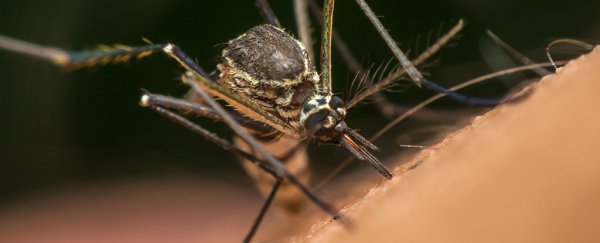As if suffering the irritating bite of a mosquito wasn't enough of a pain, new research indicates their spit has a significant effect on our immune system.
A study carried out on mice engineered to have human blood cells has measured the effects of mosquito saliva on immune responses, possibly explaining how some transmissible diseases spread so easily through the body.
News that our body responds to mosquito bites is nothing new. You only need to experience that mad itch and watch for a red lump to see your immune system's histamines at work.
But there's been a longstanding question on whether such influences over our typically protective cells might be turning them against us, helping them carry invaders deeper into our body.
To test the idea, researchers from Baylor College of Medicine looked out for changes to immune responses up to a week after a sample of transgenic mice were bitten on the feet by a handful of mosquitoes.
Previous studies had produced mixed results using mice genetically altered to only have a few types of human immune cell, not the whole ecosystem we have in our own blood.
Most such research found a major type of immune response geared towards destroying cell-invading viruses and bacteria, which might be what you'd expect our bodies to do in response to mozzie spit.
This new experiment replaced the usual blood stem cells in mice with a variety that gave rise to a complete set of human white blood cells - including all the types of T cells that fight disease.
Just six hours after being bitten, these mice were producing more of the cytotoxic T cells that attack infected cells, and fewer regulatory T cells, whose main job is to modulate the immune system.
This indicated that the researchers found the same shift towards a virus-busting response that previous studies had found.
A day later, regulatory T cells in the blood were on the rise again while other T cells decreased, indicating a counter inflammatory response was dampening down the initial surge.
But seven days after the mosquito bites, things got interesting; the team noticed a type of T cell called a 'double positive' was again appearing at elevated levels in the blood, skin, and bone marrow.
Regulatory T cells were also much lower, as were other white cells, with a mix of inhibitory and activating immune responses being implicated.
An analysis of chemical signals called cytokines also presented a complex story of pro- and anti-inflammatory activity across the week, one that was hard to explain in terms of a garden variety immune response.
Mosquito saliva is made up hundreds of different proteins, any number of which appeared to be manipulating the mice's human-like immune system in some way that didn't make a whole lot of sense if it was simply to fight off expected pathogens.
Quite the contrary, it was almost as if the immune system was offering a helping hand.
"In the context of arbovirus infection, the migration we observed would be too late to impact the initial replication or dissemination of the virus," the researchers write.
"But could allow for infected cells to return to the skin where they could transmit the virus to new mosquitoes."
There are good reasons to suspect mosquito saliva might help some pathogens infect new hosts and move through a population, but evidence has been largely limited to mouse models.
Mapping the behaviours of human immune cells – even if they're still in mice – is a step closer to understanding how infectious agents take advantage of vectors such as mosquitoes.
Approximately 750,000 people die every year from diseases that are communicated through the bite of a mosquito, a problem that promises to worsen as climate change opens new territories for these diseases.
Identifying potential weak points in the chain of infection could point the way to new forms of prevention and treatment.
While we're a long way off stamping out epidemics using mosquito spit, a vaccine against components in sand-fly saliva has been shown effective in reducing the spread of certain parasites in mice.
Right now we'll take any advantage we can get.
This research was published in PLOS Neglected Tropical Diseases.
